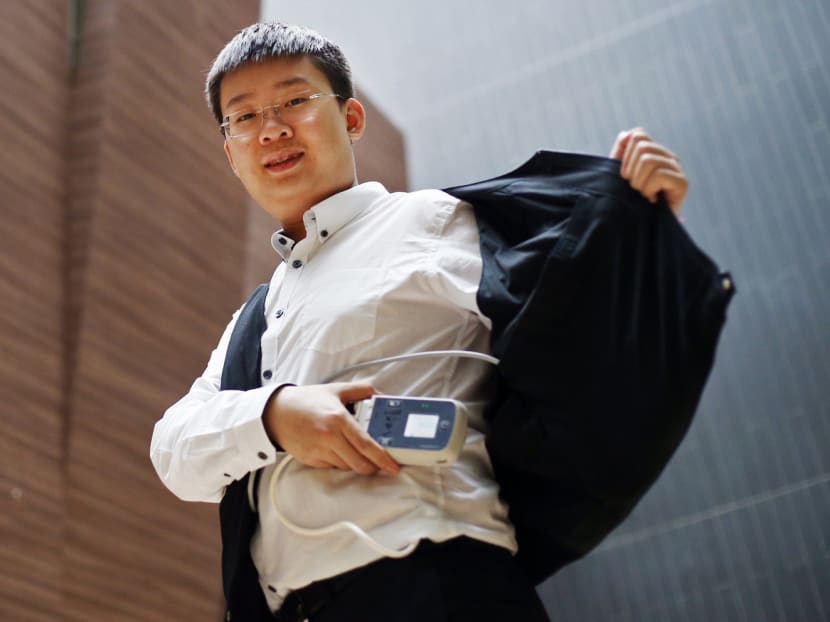Mechanical heart pump keeps this 18-year-old alive
Singapore — In late 2011, advanced heart failure left teenager Choong Wei Tzen on the brink of death. With a condition called dilated cardiomyopathy, his heart was enlarged, weakened and unable to pump blood well.

Choong Wei Tzen, 18, wears a customised vest with internal pockets to store the cables, batteries and components that power his heart. Photo: Don Wong
Singapore — In late 2011, advanced heart failure left teenager Choong Wei Tzen on the brink of death. With a condition called dilated cardiomyopathy, his heart was enlarged, weakened and unable to pump blood well.
More than four years on, the 18-year-old is still alive and well after doctors from the National Heart Centre Singapore (NHCS) surgically implanted a mechanical heart device, known as a left ventricular assist device (LVAD), inside his chest to help his failing heart continuously pump blood around the body.
Only 14 then, Wei Tzen is the youngest patient in Asia to have undergone the HeartMate II heart assist device implantation in 2011, according to the NHCS.
“Without the machine, I would have died four years ago,” he said.
“I was so ill that medication could no longer do much for my heart condition. I needed a heart transplant but that wasn’t available.”
The device, which is powered by lithium-ion batteries, is buying him time while he awaits a heart transplant. While the patient’s heart still continues to pump blood even with the device implanted, it is insufficient to meet the body’s needs, said Dr C Sivathasan, who is director of NHCS’ Heart Transplant and Mechanical Assist Device Programme.
“The LVAD serves to make up for the shortfall. The patient will be able to function normally as the device helps to relieve heart failure symptoms such as shortness of breath, frequent coughing and swollen feet, ankles and legs,” he said.
Implanted on the left side of the heart, the heart pump is connected to a computer controller and battery pack via a cable called the driveline.
The latter components remain outside the body through a permanent wound site on Wei Tzen’s abdomen, which his father helps to clean and dress every day.
To get around more conveniently, the teenager wears a customised vest to hold the external controller, battery pack and backup batteries — weighing about 2kg in total.
Each battery pack lasts about 13 hours, and has to be recharged daily via a wall socket.
For the Serangoon Junior College student, who is currently interning at a government agency while waiting for his A Level examination results, life has taken a 180-degree turn.
Having to lug the device’s external parts around means giving up some of his favourite sports, such as swimming and taekwondo.
He also has to avoid crowds, so shopping in Chinatown this festive season is a no-go.
“I can’t do anything strenuous or activities that involve submerging in water. Initially, I felt a great loss because those two sports were part and parcel of my childhood. But what comforts me is knowing I am alive and that, one day, I might be able to resume all the activities I love again,” said Wei Tzen.
There is also a niggling fear that the batteries for his heart pump may run out of power, and taking public transport makes him nervous. “I have a nagging worry that people may think I’m a terrorist (because of the external computer controller and battery packs I have to carry around at all times),” he said.
Still, Wei Tzen knows he is fortunate to have another stab at a near-normal life, one that is not plagued by breathlessness and fatigue.
He is also optimistic about his future and has big career plans.
Pointing to his chest, he said: “I would like to study engineering, focusing on research and development, so that I can construct devices like the one I have here to help others.
“When you have a life-changing experience and received a lot of help from others along the way, you’ll naturally feel an obligation to contribute back to society.”






